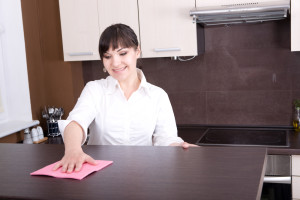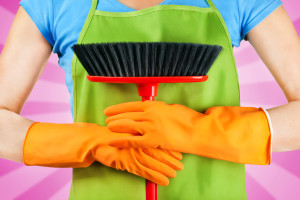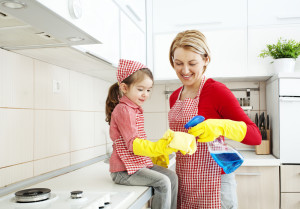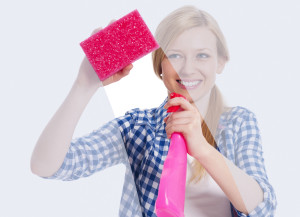
A big step towards a healthy lifestyle is choosing eco-friendly cleaning products for your household. By removing toxic detergents from your place you are sure to sleep better, worry less and concentrate easily. If you want to reduce the poisonous burden on the environment and provide yourself and your family with clean and fresh air to breathe inside your home, check out these tips, choose what you need and see the immediate results on your life.
Many people keep hazardous cleaning products in the cupboard under their kitchen sinks. You can read labels stating “danger” and “warning” on most of them, from powdered products to cockroach sprays. It would be a great idea to replace these poisonous supplies with safe ones, made in your home, to ensure cleaner air and safer environment for yourself and your children. Still, if you want to keep at least some of those products, make sure you keep them in a locked cupboard somewhere higher above the ground to prevent accidents from occurring. Always read thoroughly the labels to make sure you use them safely and correctly. Do not pour dangerous materials down the drain or throw them in the garbage cans. They are sure to cause problems in the waste stream. Try choosing biodegradable substitutes for the toxic detergents. Solutions of baking soda, salt, vinegar and/or lemon are not only safe, but sometimes do a better job than ammonia, bleach and other poisonous liquids. They do not damage the skin, eyes and your whole system if swallowed or accidentally spilled and it is highly unlikely that they will increase any allergies. In addition, using them saves you money and time. Moreover, you should avoid using paper towels and use cloth rags (made of old clothes for example). Avoid nonrenewable resources. If your water is hard, use a detergent instead of soap.  Do not waste water, preserve it. Avoid mopping when you could use a broom, put a rug at the door to gather dirt to avoid washing the floor frequently. Try not to run it without using it or put a bucket under the tap to collect it for later use. It would be a good idea to keep plants inside, as they are said to reduce air pollution and provide the place with more oxygen. Above all, use your senses to find out when things need to be cleaned and your experience to choose the best cleaning products for each thing.
Do not waste water, preserve it. Avoid mopping when you could use a broom, put a rug at the door to gather dirt to avoid washing the floor frequently. Try not to run it without using it or put a bucket under the tap to collect it for later use. It would be a good idea to keep plants inside, as they are said to reduce air pollution and provide the place with more oxygen. Above all, use your senses to find out when things need to be cleaned and your experience to choose the best cleaning products for each thing.
Make a step towards an eco-friendly home today. Replace your poisonous cleaning products, preserve water and be responsible for the air you breathe. The results will be seen in no time and you will have made a contribution to the whole world.
Bio: Cindy Davis is dedicated blogger and housewife. She likes writing about home remodeling and household cleaning related topics. Therefore her present article treats eco-friendly house cleaning and maintenance theme. For more helpful tips and hints, visit: http://www.carpetcleanerscleaning.co.uk/W2-carpet-cleaners/bayswater-cleaning-carpets-W2.html





